Economics for Managers: The Great Recession
VerifiedAdded on 2019/11/20
|10
|2231
|452
Essay
AI Summary
This essay analyzes the 2008 Great Recession, examining its causes, including the US housing bubble, easy loan policies, and the repackaging of bad loans. It discusses the role of the 'Great Moderation' in fostering complacency and the subsequent liquidity crisis in banks. The essay also explores why the recession lasted so long, referencing the paradox of thrift and the zero-lower bound on nominal interest rates. Furthermore, it examines the recession's impact on macroeconomic theory, highlighting the discrediting of traditional paradigms like the IS-LM model and the increased focus on integrating financial factors into macroeconomic analysis. The conclusion emphasizes the need for continuous review of monetary policy, stricter lending practices, and proactive government intervention to prevent future crises.
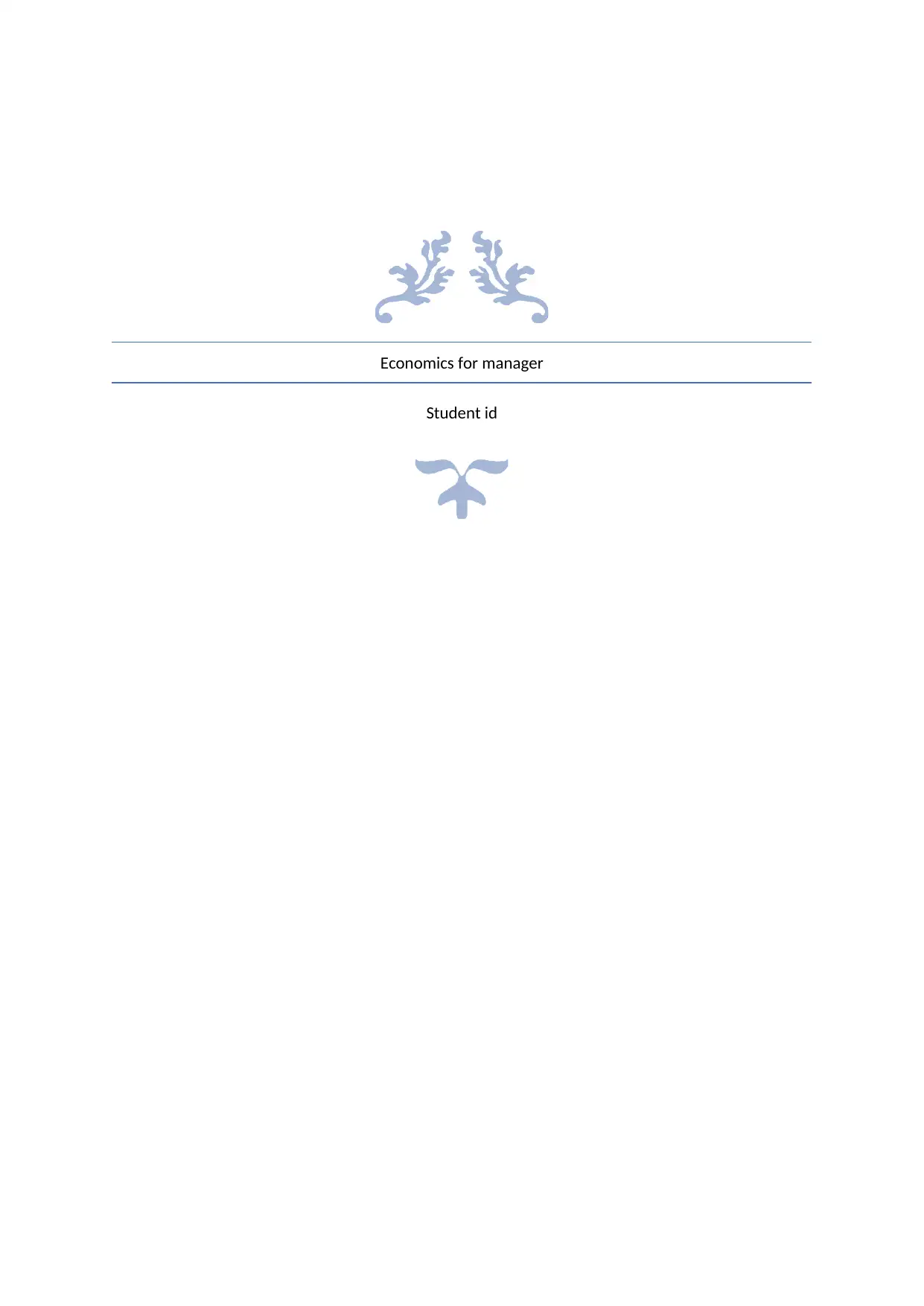
Economics for manager
Student id
Student id
Paraphrase This Document
Need a fresh take? Get an instant paraphrase of this document with our AI Paraphraser
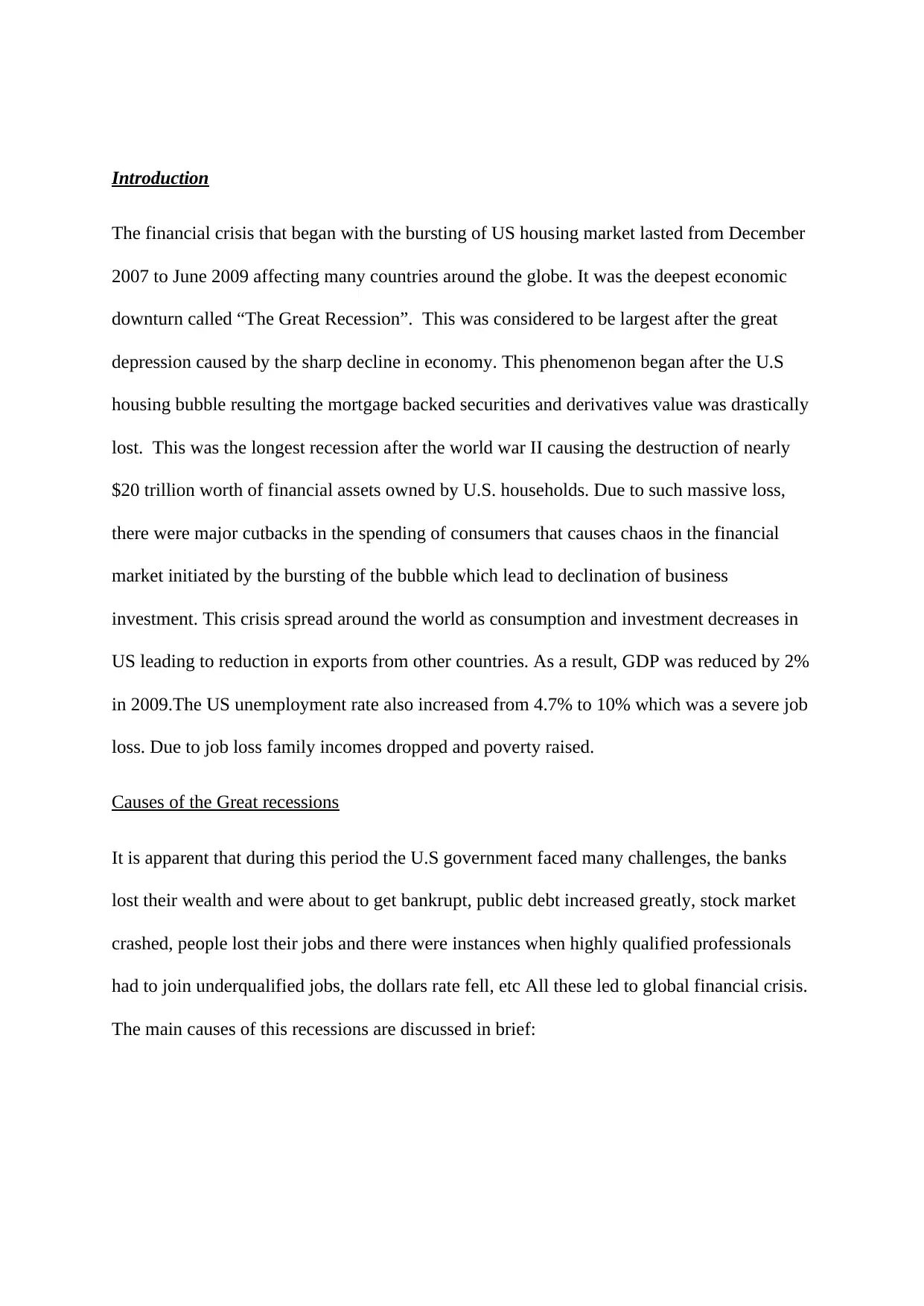
Introduction
The financial crisis that began with the bursting of US housing market lasted from December
2007 to June 2009 affecting many countries around the globe. It was the deepest economic
downturn called “The Great Recession”. This was considered to be largest after the great
depression caused by the sharp decline in economy. This phenomenon began after the U.S
housing bubble resulting the mortgage backed securities and derivatives value was drastically
lost. This was the longest recession after the world war II causing the destruction of nearly
$20 trillion worth of financial assets owned by U.S. households. Due to such massive loss,
there were major cutbacks in the spending of consumers that causes chaos in the financial
market initiated by the bursting of the bubble which lead to declination of business
investment. This crisis spread around the world as consumption and investment decreases in
US leading to reduction in exports from other countries. As a result, GDP was reduced by 2%
in 2009.The US unemployment rate also increased from 4.7% to 10% which was a severe job
loss. Due to job loss family incomes dropped and poverty raised.
Causes of the Great recessions
It is apparent that during this period the U.S government faced many challenges, the banks
lost their wealth and were about to get bankrupt, public debt increased greatly, stock market
crashed, people lost their jobs and there were instances when highly qualified professionals
had to join underqualified jobs, the dollars rate fell, etc All these led to global financial crisis.
The main causes of this recessions are discussed in brief:
The financial crisis that began with the bursting of US housing market lasted from December
2007 to June 2009 affecting many countries around the globe. It was the deepest economic
downturn called “The Great Recession”. This was considered to be largest after the great
depression caused by the sharp decline in economy. This phenomenon began after the U.S
housing bubble resulting the mortgage backed securities and derivatives value was drastically
lost. This was the longest recession after the world war II causing the destruction of nearly
$20 trillion worth of financial assets owned by U.S. households. Due to such massive loss,
there were major cutbacks in the spending of consumers that causes chaos in the financial
market initiated by the bursting of the bubble which lead to declination of business
investment. This crisis spread around the world as consumption and investment decreases in
US leading to reduction in exports from other countries. As a result, GDP was reduced by 2%
in 2009.The US unemployment rate also increased from 4.7% to 10% which was a severe job
loss. Due to job loss family incomes dropped and poverty raised.
Causes of the Great recessions
It is apparent that during this period the U.S government faced many challenges, the banks
lost their wealth and were about to get bankrupt, public debt increased greatly, stock market
crashed, people lost their jobs and there were instances when highly qualified professionals
had to join underqualified jobs, the dollars rate fell, etc All these led to global financial crisis.
The main causes of this recessions are discussed in brief:
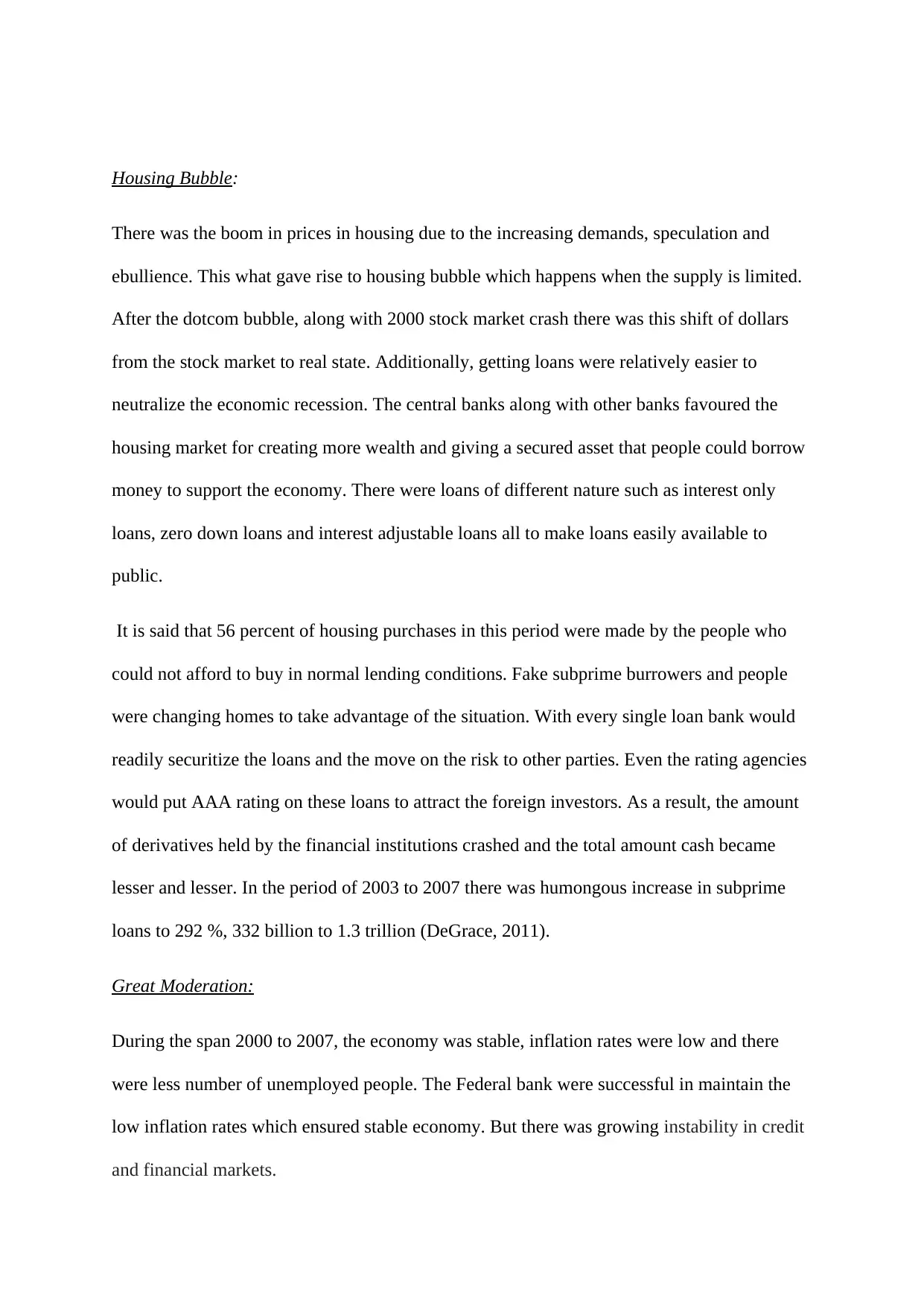
Housing Bubble:
There was the boom in prices in housing due to the increasing demands, speculation and
ebullience. This what gave rise to housing bubble which happens when the supply is limited.
After the dotcom bubble, along with 2000 stock market crash there was this shift of dollars
from the stock market to real state. Additionally, getting loans were relatively easier to
neutralize the economic recession. The central banks along with other banks favoured the
housing market for creating more wealth and giving a secured asset that people could borrow
money to support the economy. There were loans of different nature such as interest only
loans, zero down loans and interest adjustable loans all to make loans easily available to
public.
It is said that 56 percent of housing purchases in this period were made by the people who
could not afford to buy in normal lending conditions. Fake subprime burrowers and people
were changing homes to take advantage of the situation. With every single loan bank would
readily securitize the loans and the move on the risk to other parties. Even the rating agencies
would put AAA rating on these loans to attract the foreign investors. As a result, the amount
of derivatives held by the financial institutions crashed and the total amount cash became
lesser and lesser. In the period of 2003 to 2007 there was humongous increase in subprime
loans to 292 %, 332 billion to 1.3 trillion (DeGrace, 2011).
Great Moderation:
During the span 2000 to 2007, the economy was stable, inflation rates were low and there
were less number of unemployed people. The Federal bank were successful in maintain the
low inflation rates which ensured stable economy. But there was growing instability in credit
and financial markets.
There was the boom in prices in housing due to the increasing demands, speculation and
ebullience. This what gave rise to housing bubble which happens when the supply is limited.
After the dotcom bubble, along with 2000 stock market crash there was this shift of dollars
from the stock market to real state. Additionally, getting loans were relatively easier to
neutralize the economic recession. The central banks along with other banks favoured the
housing market for creating more wealth and giving a secured asset that people could borrow
money to support the economy. There were loans of different nature such as interest only
loans, zero down loans and interest adjustable loans all to make loans easily available to
public.
It is said that 56 percent of housing purchases in this period were made by the people who
could not afford to buy in normal lending conditions. Fake subprime burrowers and people
were changing homes to take advantage of the situation. With every single loan bank would
readily securitize the loans and the move on the risk to other parties. Even the rating agencies
would put AAA rating on these loans to attract the foreign investors. As a result, the amount
of derivatives held by the financial institutions crashed and the total amount cash became
lesser and lesser. In the period of 2003 to 2007 there was humongous increase in subprime
loans to 292 %, 332 billion to 1.3 trillion (DeGrace, 2011).
Great Moderation:
During the span 2000 to 2007, the economy was stable, inflation rates were low and there
were less number of unemployed people. The Federal bank were successful in maintain the
low inflation rates which ensured stable economy. But there was growing instability in credit
and financial markets.
⊘ This is a preview!⊘
Do you want full access?
Subscribe today to unlock all pages.

Trusted by 1+ million students worldwide
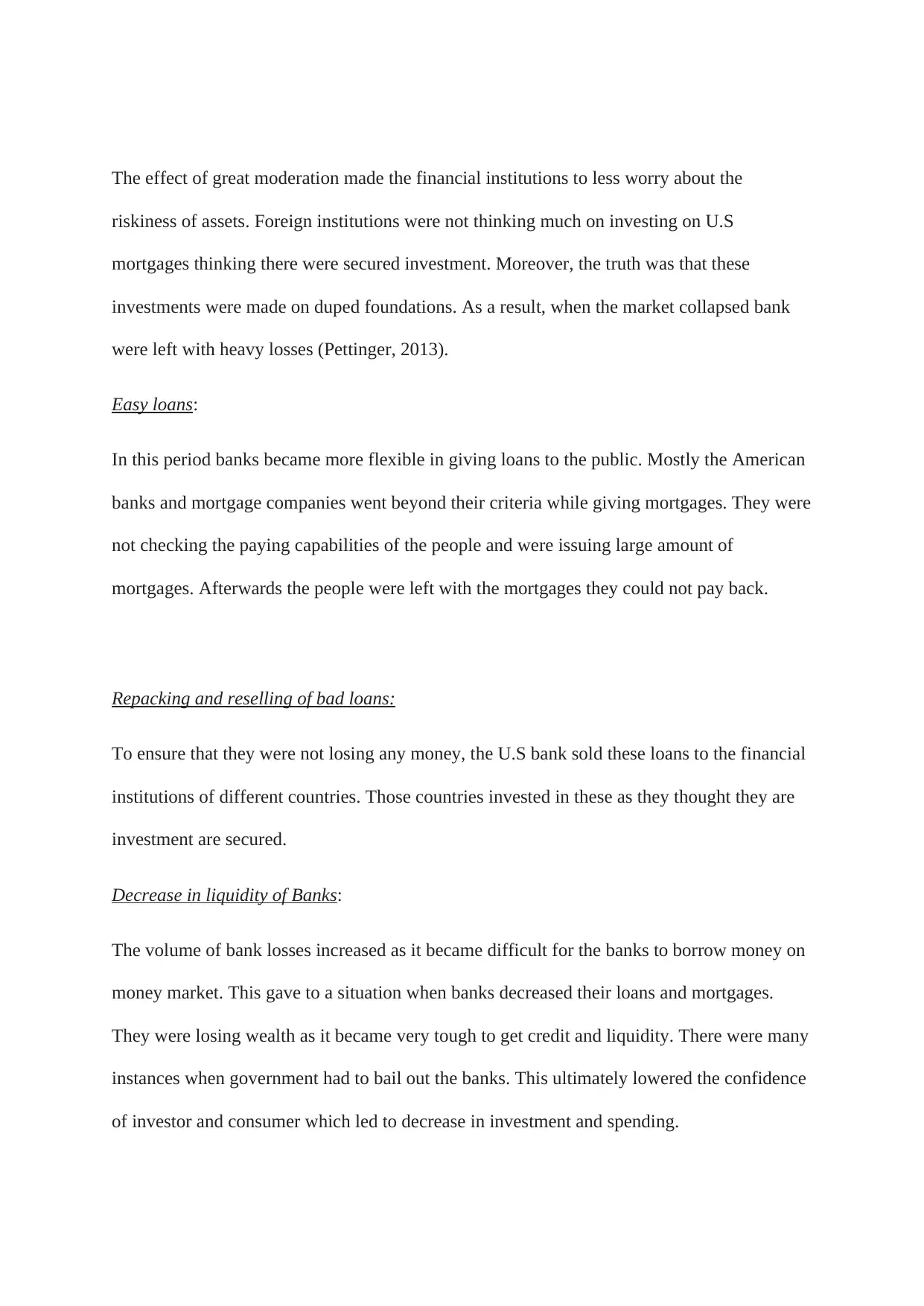
The effect of great moderation made the financial institutions to less worry about the
riskiness of assets. Foreign institutions were not thinking much on investing on U.S
mortgages thinking there were secured investment. Moreover, the truth was that these
investments were made on duped foundations. As a result, when the market collapsed bank
were left with heavy losses (Pettinger, 2013).
Easy loans:
In this period banks became more flexible in giving loans to the public. Mostly the American
banks and mortgage companies went beyond their criteria while giving mortgages. They were
not checking the paying capabilities of the people and were issuing large amount of
mortgages. Afterwards the people were left with the mortgages they could not pay back.
Repacking and reselling of bad loans:
To ensure that they were not losing any money, the U.S bank sold these loans to the financial
institutions of different countries. Those countries invested in these as they thought they are
investment are secured.
Decrease in liquidity of Banks:
The volume of bank losses increased as it became difficult for the banks to borrow money on
money market. This gave to a situation when banks decreased their loans and mortgages.
They were losing wealth as it became very tough to get credit and liquidity. There were many
instances when government had to bail out the banks. This ultimately lowered the confidence
of investor and consumer which led to decrease in investment and spending.
riskiness of assets. Foreign institutions were not thinking much on investing on U.S
mortgages thinking there were secured investment. Moreover, the truth was that these
investments were made on duped foundations. As a result, when the market collapsed bank
were left with heavy losses (Pettinger, 2013).
Easy loans:
In this period banks became more flexible in giving loans to the public. Mostly the American
banks and mortgage companies went beyond their criteria while giving mortgages. They were
not checking the paying capabilities of the people and were issuing large amount of
mortgages. Afterwards the people were left with the mortgages they could not pay back.
Repacking and reselling of bad loans:
To ensure that they were not losing any money, the U.S bank sold these loans to the financial
institutions of different countries. Those countries invested in these as they thought they are
investment are secured.
Decrease in liquidity of Banks:
The volume of bank losses increased as it became difficult for the banks to borrow money on
money market. This gave to a situation when banks decreased their loans and mortgages.
They were losing wealth as it became very tough to get credit and liquidity. There were many
instances when government had to bail out the banks. This ultimately lowered the confidence
of investor and consumer which led to decrease in investment and spending.
Paraphrase This Document
Need a fresh take? Get an instant paraphrase of this document with our AI Paraphraser
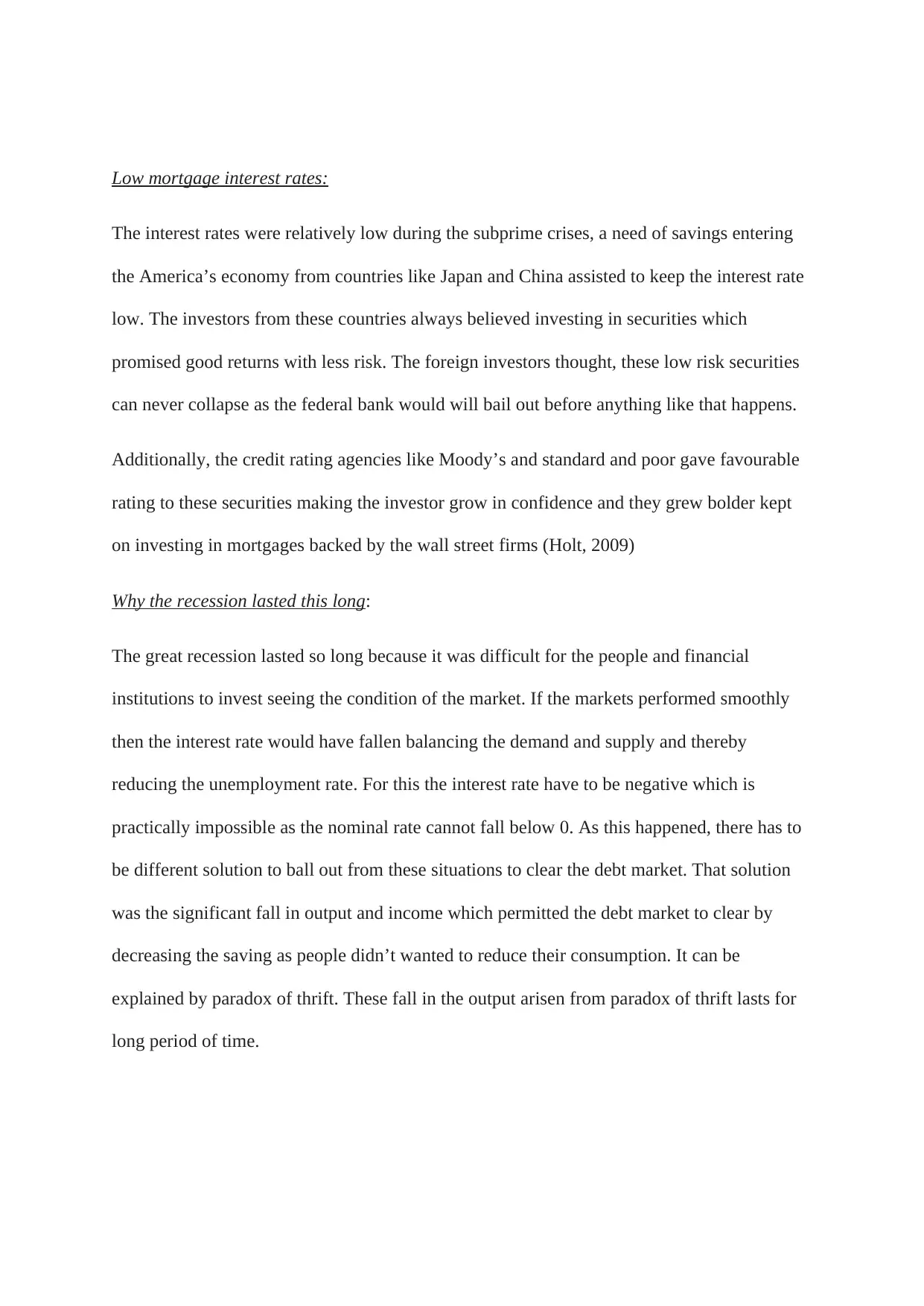
Low mortgage interest rates:
The interest rates were relatively low during the subprime crises, a need of savings entering
the America’s economy from countries like Japan and China assisted to keep the interest rate
low. The investors from these countries always believed investing in securities which
promised good returns with less risk. The foreign investors thought, these low risk securities
can never collapse as the federal bank would will bail out before anything like that happens.
Additionally, the credit rating agencies like Moody’s and standard and poor gave favourable
rating to these securities making the investor grow in confidence and they grew bolder kept
on investing in mortgages backed by the wall street firms (Holt, 2009)
Why the recession lasted this long:
The great recession lasted so long because it was difficult for the people and financial
institutions to invest seeing the condition of the market. If the markets performed smoothly
then the interest rate would have fallen balancing the demand and supply and thereby
reducing the unemployment rate. For this the interest rate have to be negative which is
practically impossible as the nominal rate cannot fall below 0. As this happened, there has to
be different solution to ball out from these situations to clear the debt market. That solution
was the significant fall in output and income which permitted the debt market to clear by
decreasing the saving as people didn’t wanted to reduce their consumption. It can be
explained by paradox of thrift. These fall in the output arisen from paradox of thrift lasts for
long period of time.
The interest rates were relatively low during the subprime crises, a need of savings entering
the America’s economy from countries like Japan and China assisted to keep the interest rate
low. The investors from these countries always believed investing in securities which
promised good returns with less risk. The foreign investors thought, these low risk securities
can never collapse as the federal bank would will bail out before anything like that happens.
Additionally, the credit rating agencies like Moody’s and standard and poor gave favourable
rating to these securities making the investor grow in confidence and they grew bolder kept
on investing in mortgages backed by the wall street firms (Holt, 2009)
Why the recession lasted this long:
The great recession lasted so long because it was difficult for the people and financial
institutions to invest seeing the condition of the market. If the markets performed smoothly
then the interest rate would have fallen balancing the demand and supply and thereby
reducing the unemployment rate. For this the interest rate have to be negative which is
practically impossible as the nominal rate cannot fall below 0. As this happened, there has to
be different solution to ball out from these situations to clear the debt market. That solution
was the significant fall in output and income which permitted the debt market to clear by
decreasing the saving as people didn’t wanted to reduce their consumption. It can be
explained by paradox of thrift. These fall in the output arisen from paradox of thrift lasts for
long period of time.
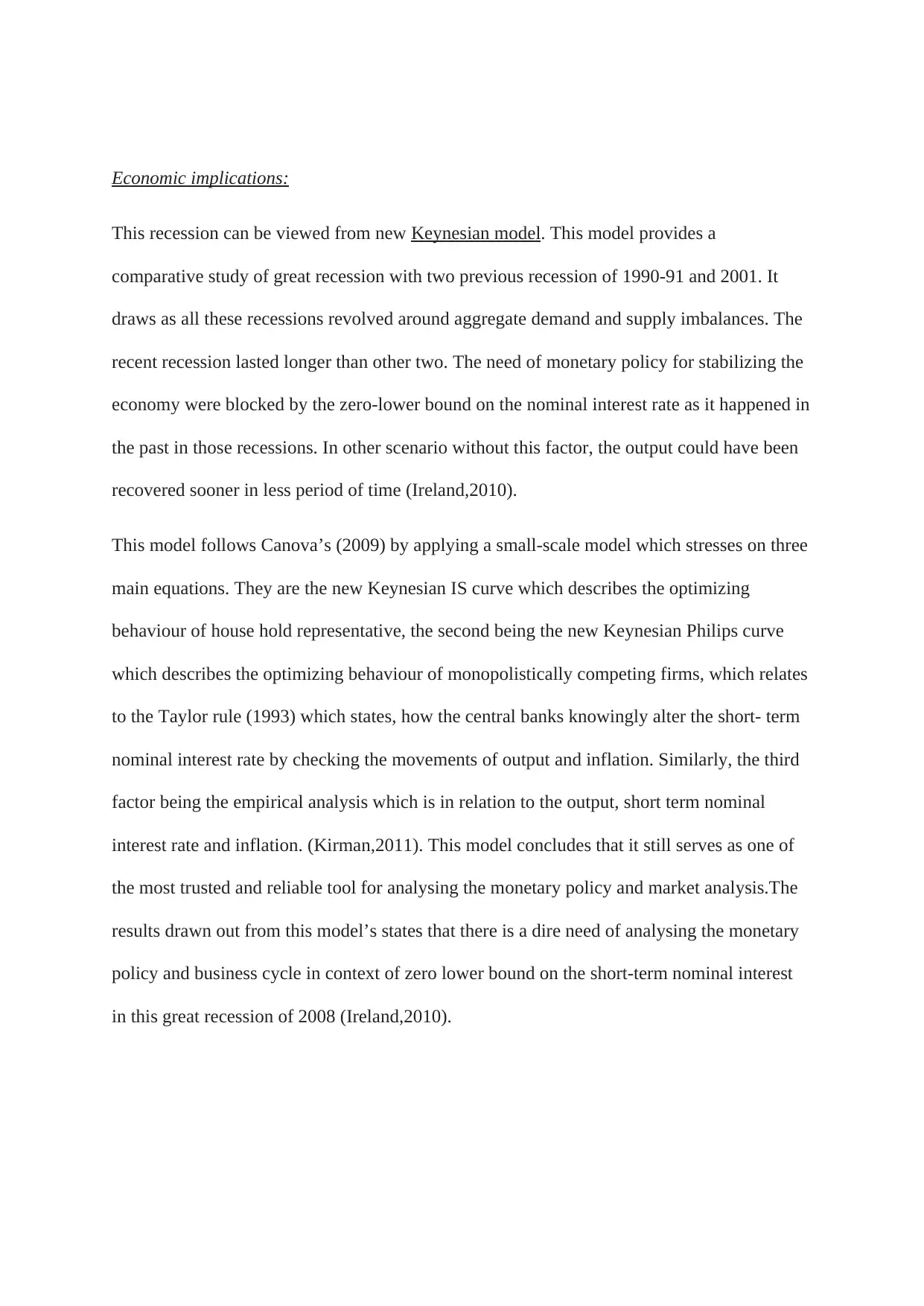
Economic implications:
This recession can be viewed from new Keynesian model. This model provides a
comparative study of great recession with two previous recession of 1990-91 and 2001. It
draws as all these recessions revolved around aggregate demand and supply imbalances. The
recent recession lasted longer than other two. The need of monetary policy for stabilizing the
economy were blocked by the zero-lower bound on the nominal interest rate as it happened in
the past in those recessions. In other scenario without this factor, the output could have been
recovered sooner in less period of time (Ireland,2010).
This model follows Canova’s (2009) by applying a small-scale model which stresses on three
main equations. They are the new Keynesian IS curve which describes the optimizing
behaviour of house hold representative, the second being the new Keynesian Philips curve
which describes the optimizing behaviour of monopolistically competing firms, which relates
to the Taylor rule (1993) which states, how the central banks knowingly alter the short- term
nominal interest rate by checking the movements of output and inflation. Similarly, the third
factor being the empirical analysis which is in relation to the output, short term nominal
interest rate and inflation. (Kirman,2011). This model concludes that it still serves as one of
the most trusted and reliable tool for analysing the monetary policy and market analysis.The
results drawn out from this model’s states that there is a dire need of analysing the monetary
policy and business cycle in context of zero lower bound on the short-term nominal interest
in this great recession of 2008 (Ireland,2010).
This recession can be viewed from new Keynesian model. This model provides a
comparative study of great recession with two previous recession of 1990-91 and 2001. It
draws as all these recessions revolved around aggregate demand and supply imbalances. The
recent recession lasted longer than other two. The need of monetary policy for stabilizing the
economy were blocked by the zero-lower bound on the nominal interest rate as it happened in
the past in those recessions. In other scenario without this factor, the output could have been
recovered sooner in less period of time (Ireland,2010).
This model follows Canova’s (2009) by applying a small-scale model which stresses on three
main equations. They are the new Keynesian IS curve which describes the optimizing
behaviour of house hold representative, the second being the new Keynesian Philips curve
which describes the optimizing behaviour of monopolistically competing firms, which relates
to the Taylor rule (1993) which states, how the central banks knowingly alter the short- term
nominal interest rate by checking the movements of output and inflation. Similarly, the third
factor being the empirical analysis which is in relation to the output, short term nominal
interest rate and inflation. (Kirman,2011). This model concludes that it still serves as one of
the most trusted and reliable tool for analysing the monetary policy and market analysis.The
results drawn out from this model’s states that there is a dire need of analysing the monetary
policy and business cycle in context of zero lower bound on the short-term nominal interest
in this great recession of 2008 (Ireland,2010).
⊘ This is a preview!⊘
Do you want full access?
Subscribe today to unlock all pages.

Trusted by 1+ million students worldwide
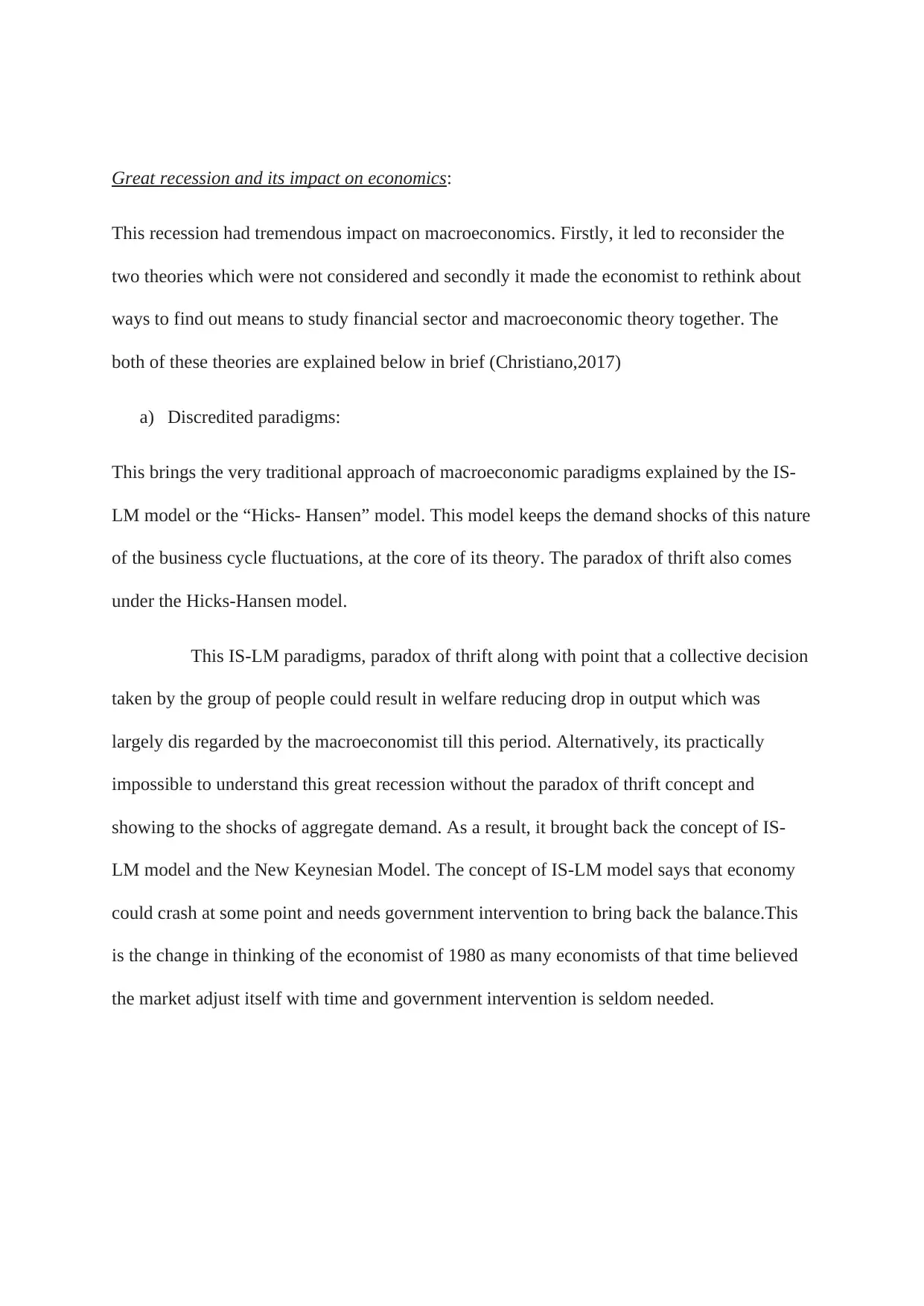
Great recession and its impact on economics:
This recession had tremendous impact on macroeconomics. Firstly, it led to reconsider the
two theories which were not considered and secondly it made the economist to rethink about
ways to find out means to study financial sector and macroeconomic theory together. The
both of these theories are explained below in brief (Christiano,2017)
a) Discredited paradigms:
This brings the very traditional approach of macroeconomic paradigms explained by the IS-
LM model or the “Hicks- Hansen” model. This model keeps the demand shocks of this nature
of the business cycle fluctuations, at the core of its theory. The paradox of thrift also comes
under the Hicks-Hansen model.
This IS-LM paradigms, paradox of thrift along with point that a collective decision
taken by the group of people could result in welfare reducing drop in output which was
largely dis regarded by the macroeconomist till this period. Alternatively, its practically
impossible to understand this great recession without the paradox of thrift concept and
showing to the shocks of aggregate demand. As a result, it brought back the concept of IS-
LM model and the New Keynesian Model. The concept of IS-LM model says that economy
could crash at some point and needs government intervention to bring back the balance.This
is the change in thinking of the economist of 1980 as many economists of that time believed
the market adjust itself with time and government intervention is seldom needed.
This recession had tremendous impact on macroeconomics. Firstly, it led to reconsider the
two theories which were not considered and secondly it made the economist to rethink about
ways to find out means to study financial sector and macroeconomic theory together. The
both of these theories are explained below in brief (Christiano,2017)
a) Discredited paradigms:
This brings the very traditional approach of macroeconomic paradigms explained by the IS-
LM model or the “Hicks- Hansen” model. This model keeps the demand shocks of this nature
of the business cycle fluctuations, at the core of its theory. The paradox of thrift also comes
under the Hicks-Hansen model.
This IS-LM paradigms, paradox of thrift along with point that a collective decision
taken by the group of people could result in welfare reducing drop in output which was
largely dis regarded by the macroeconomist till this period. Alternatively, its practically
impossible to understand this great recession without the paradox of thrift concept and
showing to the shocks of aggregate demand. As a result, it brought back the concept of IS-
LM model and the New Keynesian Model. The concept of IS-LM model says that economy
could crash at some point and needs government intervention to bring back the balance.This
is the change in thinking of the economist of 1980 as many economists of that time believed
the market adjust itself with time and government intervention is seldom needed.
Paraphrase This Document
Need a fresh take? Get an instant paraphrase of this document with our AI Paraphraser
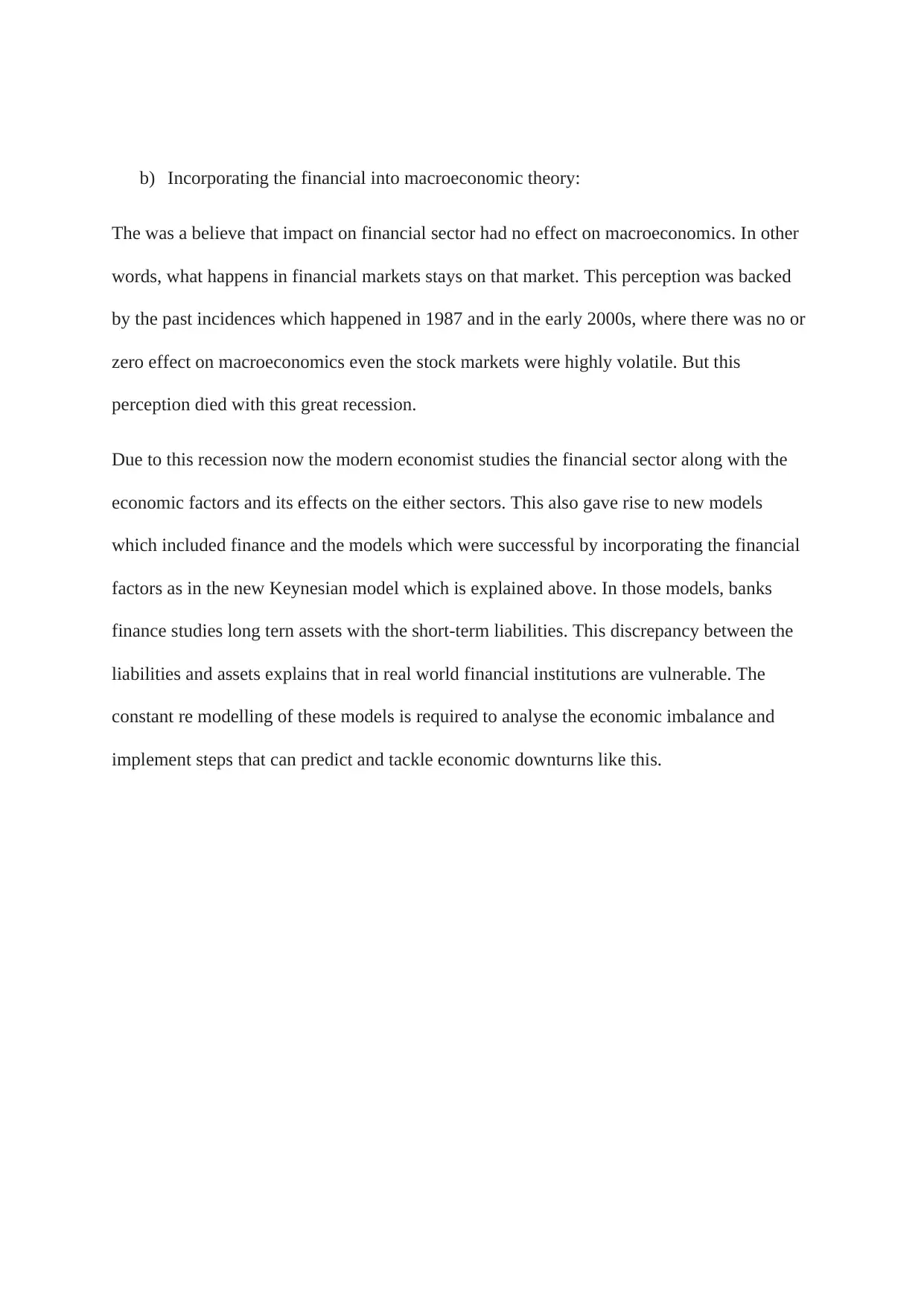
b) Incorporating the financial into macroeconomic theory:
The was a believe that impact on financial sector had no effect on macroeconomics. In other
words, what happens in financial markets stays on that market. This perception was backed
by the past incidences which happened in 1987 and in the early 2000s, where there was no or
zero effect on macroeconomics even the stock markets were highly volatile. But this
perception died with this great recession.
Due to this recession now the modern economist studies the financial sector along with the
economic factors and its effects on the either sectors. This also gave rise to new models
which included finance and the models which were successful by incorporating the financial
factors as in the new Keynesian model which is explained above. In those models, banks
finance studies long tern assets with the short-term liabilities. This discrepancy between the
liabilities and assets explains that in real world financial institutions are vulnerable. The
constant re modelling of these models is required to analyse the economic imbalance and
implement steps that can predict and tackle economic downturns like this.
The was a believe that impact on financial sector had no effect on macroeconomics. In other
words, what happens in financial markets stays on that market. This perception was backed
by the past incidences which happened in 1987 and in the early 2000s, where there was no or
zero effect on macroeconomics even the stock markets were highly volatile. But this
perception died with this great recession.
Due to this recession now the modern economist studies the financial sector along with the
economic factors and its effects on the either sectors. This also gave rise to new models
which included finance and the models which were successful by incorporating the financial
factors as in the new Keynesian model which is explained above. In those models, banks
finance studies long tern assets with the short-term liabilities. This discrepancy between the
liabilities and assets explains that in real world financial institutions are vulnerable. The
constant re modelling of these models is required to analyse the economic imbalance and
implement steps that can predict and tackle economic downturns like this.
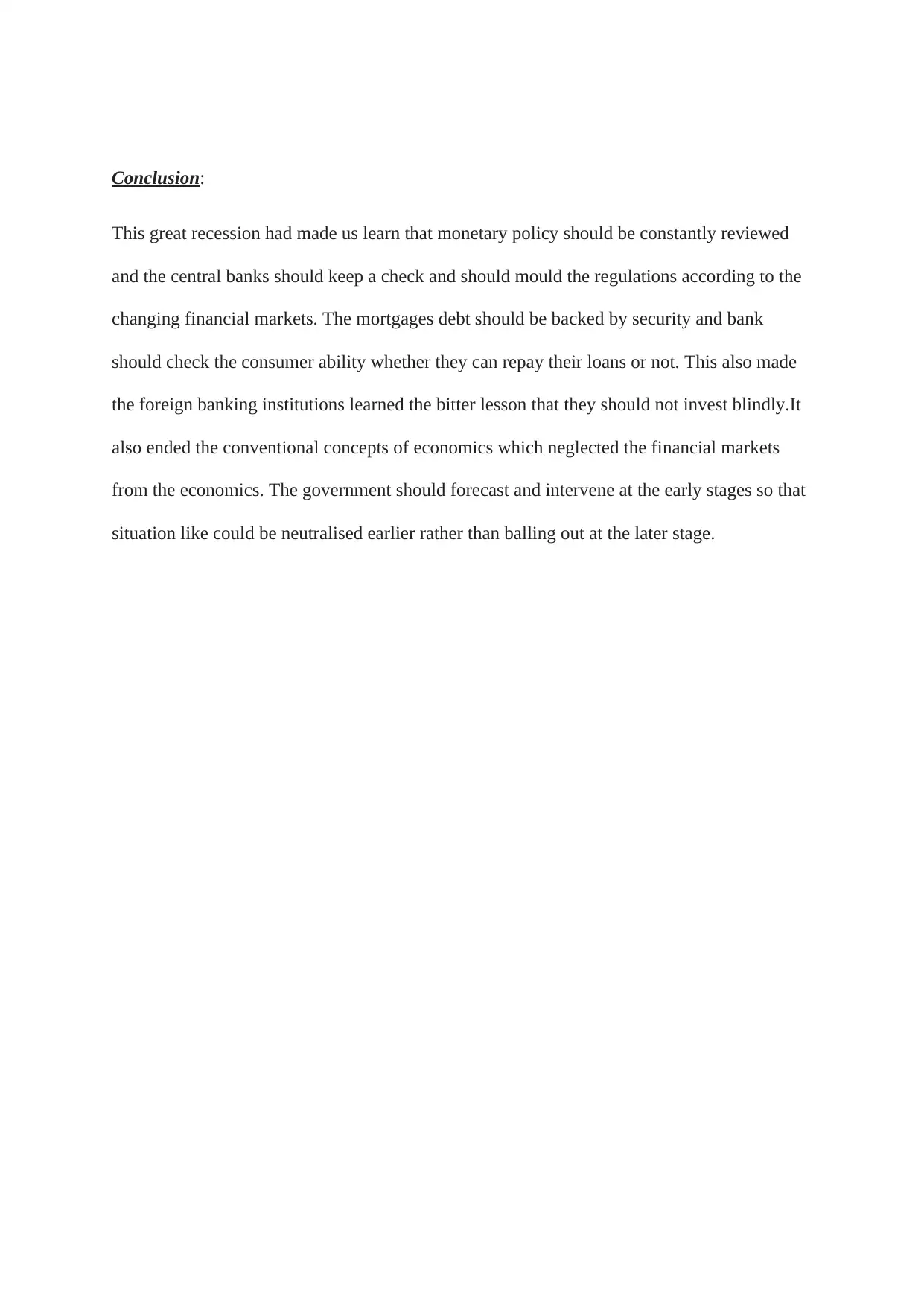
Conclusion:
This great recession had made us learn that monetary policy should be constantly reviewed
and the central banks should keep a check and should mould the regulations according to the
changing financial markets. The mortgages debt should be backed by security and bank
should check the consumer ability whether they can repay their loans or not. This also made
the foreign banking institutions learned the bitter lesson that they should not invest blindly.It
also ended the conventional concepts of economics which neglected the financial markets
from the economics. The government should forecast and intervene at the early stages so that
situation like could be neutralised earlier rather than balling out at the later stage.
This great recession had made us learn that monetary policy should be constantly reviewed
and the central banks should keep a check and should mould the regulations according to the
changing financial markets. The mortgages debt should be backed by security and bank
should check the consumer ability whether they can repay their loans or not. This also made
the foreign banking institutions learned the bitter lesson that they should not invest blindly.It
also ended the conventional concepts of economics which neglected the financial markets
from the economics. The government should forecast and intervene at the early stages so that
situation like could be neutralised earlier rather than balling out at the later stage.
⊘ This is a preview!⊘
Do you want full access?
Subscribe today to unlock all pages.

Trusted by 1+ million students worldwide
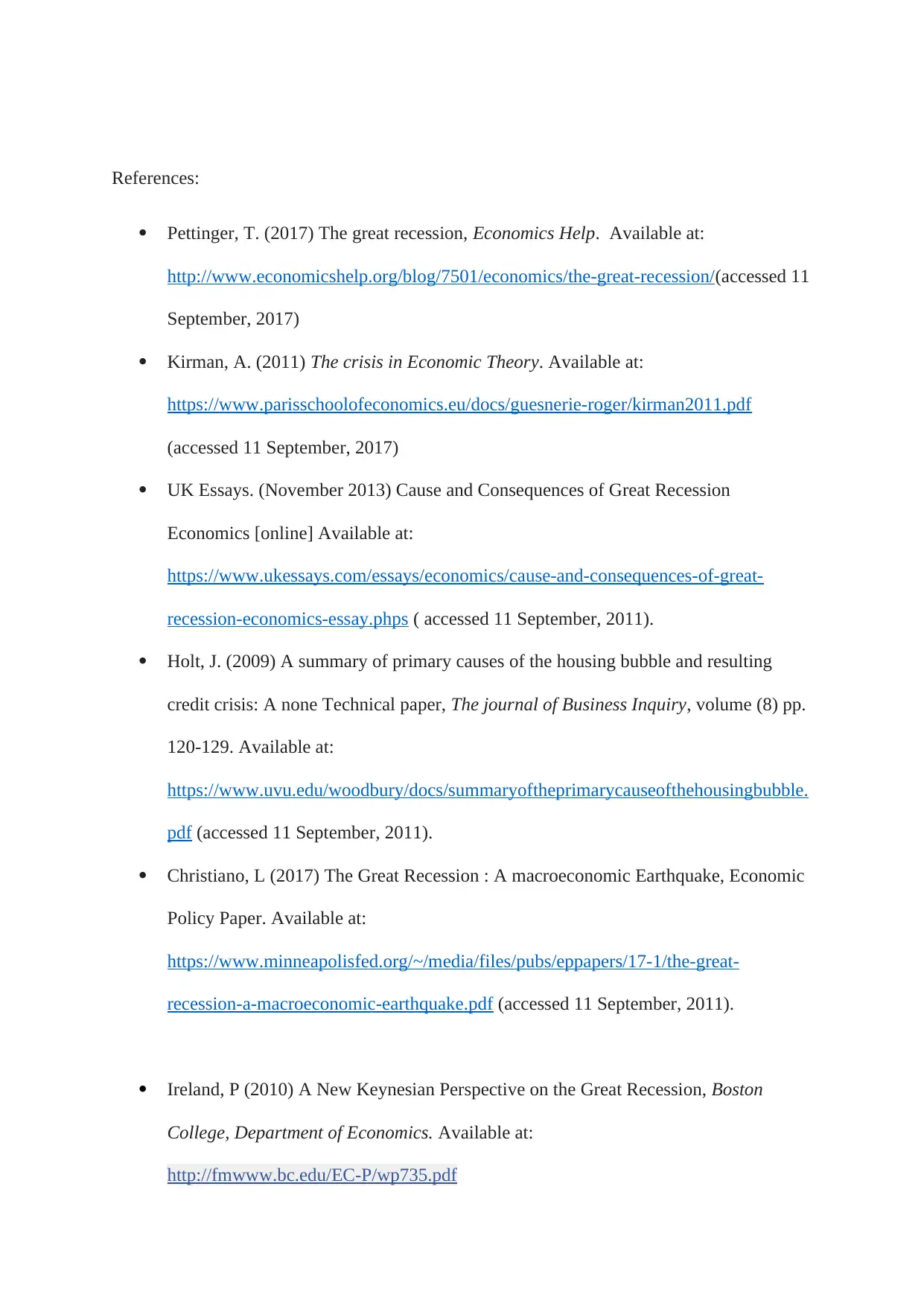
References:
Pettinger, T. (2017) The great recession, Economics Help. Available at:
http://www.economicshelp.org/blog/7501/economics/the-great-recession/(accessed 11
September, 2017)
Kirman, A. (2011) The crisis in Economic Theory. Available at:
https://www.parisschoolofeconomics.eu/docs/guesnerie-roger/kirman2011.pdf
(accessed 11 September, 2017)
UK Essays. (November 2013) Cause and Consequences of Great Recession
Economics [online] Available at:
https://www.ukessays.com/essays/economics/cause-and-consequences-of-great-
recession-economics-essay.phps ( accessed 11 September, 2011).
Holt, J. (2009) A summary of primary causes of the housing bubble and resulting
credit crisis: A none Technical paper, The journal of Business Inquiry, volume (8) pp.
120-129. Available at:
https://www.uvu.edu/woodbury/docs/summaryoftheprimarycauseofthehousingbubble.
pdf (accessed 11 September, 2011).
Christiano, L (2017) The Great Recession : A macroeconomic Earthquake, Economic
Policy Paper. Available at:
https://www.minneapolisfed.org/~/media/files/pubs/eppapers/17-1/the-great-
recession-a-macroeconomic-earthquake.pdf (accessed 11 September, 2011).
Ireland, P (2010) A New Keynesian Perspective on the Great Recession, Boston
College, Department of Economics. Available at:
http://fmwww.bc.edu/EC-P/wp735.pdf
Pettinger, T. (2017) The great recession, Economics Help. Available at:
http://www.economicshelp.org/blog/7501/economics/the-great-recession/(accessed 11
September, 2017)
Kirman, A. (2011) The crisis in Economic Theory. Available at:
https://www.parisschoolofeconomics.eu/docs/guesnerie-roger/kirman2011.pdf
(accessed 11 September, 2017)
UK Essays. (November 2013) Cause and Consequences of Great Recession
Economics [online] Available at:
https://www.ukessays.com/essays/economics/cause-and-consequences-of-great-
recession-economics-essay.phps ( accessed 11 September, 2011).
Holt, J. (2009) A summary of primary causes of the housing bubble and resulting
credit crisis: A none Technical paper, The journal of Business Inquiry, volume (8) pp.
120-129. Available at:
https://www.uvu.edu/woodbury/docs/summaryoftheprimarycauseofthehousingbubble.
pdf (accessed 11 September, 2011).
Christiano, L (2017) The Great Recession : A macroeconomic Earthquake, Economic
Policy Paper. Available at:
https://www.minneapolisfed.org/~/media/files/pubs/eppapers/17-1/the-great-
recession-a-macroeconomic-earthquake.pdf (accessed 11 September, 2011).
Ireland, P (2010) A New Keynesian Perspective on the Great Recession, Boston
College, Department of Economics. Available at:
http://fmwww.bc.edu/EC-P/wp735.pdf
1 out of 10
Related Documents
Your All-in-One AI-Powered Toolkit for Academic Success.
+13062052269
info@desklib.com
Available 24*7 on WhatsApp / Email
![[object Object]](/_next/static/media/star-bottom.7253800d.svg)
Unlock your academic potential
Copyright © 2020–2026 A2Z Services. All Rights Reserved. Developed and managed by ZUCOL.





